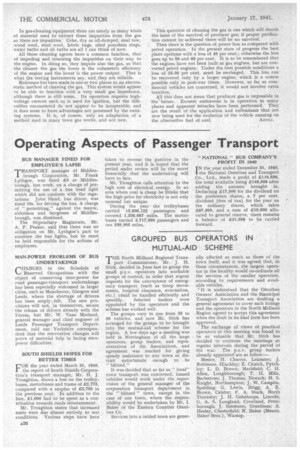Operating Aspects of Passenger Transport
Page 28

If you've noticed an error in this article please click here to report it so we can fix it.
BUS MANAGER FINED FOR EMPLOYEE'S LAPSE
r'TRANSPORT manager of Middlesrough Corporation, Mr. Frank Lythgoe, was fined £3 at Middlesbrough, last week, on a charge of permitting the use of a bus head light which did not conform with the regulations. John Hand, bus driver, was fined 10s. for driving the bus. A charge of "permitting," against the mayor, aldermen and burgesses of Middlesbrough, was dismissed.
The Stipendiary Magistrate, Mr. A. P. Peaker, said that there was no obligation on Mr. Lytligoe's part to examine the bus lights, but he must be held responsible for the actions of employees.
MAN-POWER PROBLEMS OF BUS , UNDERTAKINGS
CHANGES in the Schedule of Reserved Occupations with the object of conserving man-power for road passenger-transport undertakings has been especially welcomed in larger cities, such as Manchester, Glasgow and Leeds, where the shortage of drivers has been amply , felt. The new pro. visions will not, in themselves, secure the release of drivers already with the Forces, but Mr. W. Vane Morland, general manager and chief engineer of Leeds Passenger Transport Department, told our Yorkshire correspondent that the reservation changes will prove of material help in facing manpower difficulties.
SOUTH SHIELDS HOPES FOR BETTER TIMES
COR the year ended March 31, 1940, the report of South Shields Corporation's transport manager, Mr. H. J. Troughton, shows a loss on the trolleybuses, motorbuses and trams of £2,775, compared with a surplus of £3,793 in the previous year. In addition to the loss, £1,000 had to be spent as a contribution towards roads reinstatement.
Mr. Troughton states that increased costs were due almost entirely to war conditions. Various steps have been taken to reverse the position in the present year, and it is hoped that the period under review will be the worst financially that the undertaking will have to face.
. Mr. Troughton calls attention to the high cost of electrical. energy. In an area where coal is cheap he thinks that the high price for electricity is not only unusual but unique.
During the year the trolleybuses carried 15,896,122 passengers and covered 1,208,687 miles. The motorbuses carried 3,717,990 passengers and ran 539,305 miles. " NATIONAL " BUS COMPANY'S • PROFIT. IN 1940
IN the year ended December 31, 1940, 1 the National Omnibus and Transport Co., Ltd., made a profit of £116,636. the total available being £146,958 after adding the amount brought in. Deducting £17,500 for the dividend on the preference shares, a 7 per cent. dividend (free of tax) for the year on the ordinary shares, which takes £87,500, and a sum of £10,000 allocated to general reserve, there remains a balance of £31,958 to be carried forward.




















































